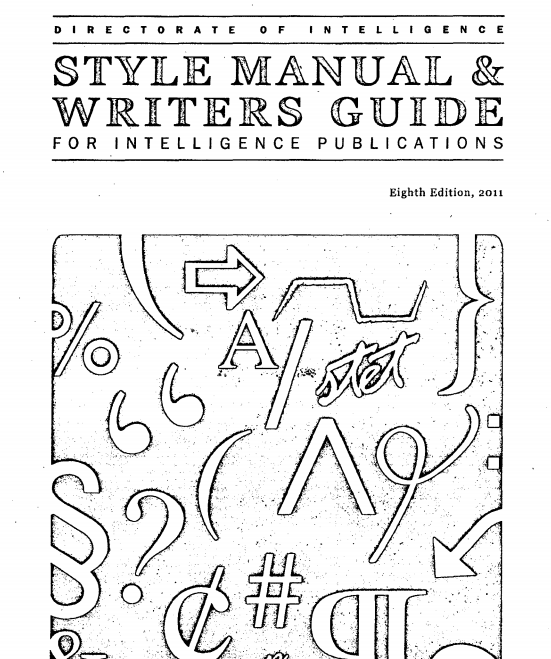Along with toppling democratically elected governments, funneling money illegally to dubious political groups and producing pornographic movies about heads of state, the Central Intelligence Agency has also been fiendishly good at manipulating language. After all, this is the organization that made “waterboarding” seem much more acceptable, at least to the Washington elite, by rebranding it as “enhanced interrogation techniques.” Another CIA turn of phrase, “extraordinary rendition,” sounds so much better to the ear than “illegal kidnapping and torture.”
Not too long ago, the CIA’s style guide, called the Style Manual and Writers Guide for Intelligence Publications, was posted online. “Good intelligence depends in large measure on clear, concise writing,” writes Fran Moore, Director of Intelligence in the foreword. And considering the agency’s deftness with the written word, it shouldn’t come as a surprise that it’s remarkably good. Some highlights:
- The guide likes the Oxford or serial comma. “Most authorities on English usage recommend [the serial comma], and it is the rule for CIA publications.”
- It favors using adjectives and adverbs sparingly. “Let nouns and verbs show their power.”
- In all cases, it favors American over British spellings, even proper names. Thus, “Labor Party” not “Labour Party.” And for that matter, the guide isn’t terribly keen on using phrases like “apropos” and “faux pas.” “Foreign expressions should be avoided because they sound hackneyed.”
- It wisely discourages writers, or anyone really, from ever using the word “enthused.”
- And they caution against using exclamation points. “Because intelligence reports are expected to be dispassionate, this punctuation mark should rarely, if ever, be used.”
And then there are some rules that will remind you this guide is the product of a particularly shadowy arm of the U.S. Government.
- The guide makes a point of defining “disinformation” as opposed to “misinformation.” “Disinformation refers to the deliberate planting of false reports. Misinformation equates in meaning but does not carry the same devious connotation.” Now you know.
- Undeclared wars, like Vietnam, should be spelled with an uncapitalized “w.” Same goes for the “Korean war” and the “Falklands war.” It goes on to argue that the writer should “avoid ‘Yom Kippur war’ which is slangy.” Presumably, the CIA prefers the term “The 1973 Arab-Israeli war.”
- The confusing split between China and Taiwan – each refuses to recognize the other — is represented confusingly here too. “For what was once called Nationalist China or the Republic of China, use only Taiwan, both as noun and as adjective. … Avoid Taiwanese as an adjective referring to the island’s administration or its officials (and do not use the term Taiwanese government.)”
It’s unclear whether or not the guide is being used for the CIA’s queasily flip, profoundly unfunny Twitter account.
If you’re looking for a more conventional style guide, remember that Strunk & White’s Elements of Style is also online.
Related Content:
How to Spot a Communist Using Literary Criticism: A 1955 Manual from the U.S. Military
How the CIA Secretly Funded Abstract Expressionism During the Cold War
Donald Duck’s Bad Nazi Dream and Four Other Disney Propaganda Cartoons from World War II
Jonathan Crow is a Los Angeles-based writer and filmmaker whose work has appeared in Yahoo!, The Hollywood Reporter, and other publications. You can follow him at @jonccrow.



Jonathan, before you wax too rhapsodic about ‘The Elements of Style’, you may find Geoffrey K. Pullam’s critique of ‘Elements’ and most particularly, the credentials of it’s authors, interesting. http://chronicle.com Section: The Chronicle Review Volume 55, Issue 32, Page B15
“it’s authors”? :-)
Wonder whether Paul Linebarger was involved?